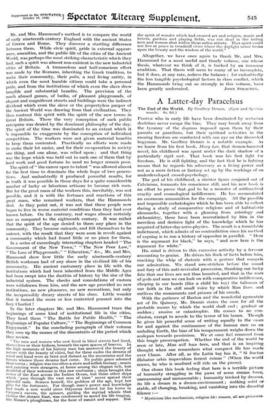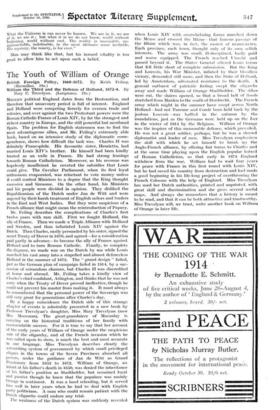A Latter-day Paracelsus
PEOPLE who in early life have been dominated • by sectarian doctrines never escape the bias. They may break away from the tyranny of the dogmas imposed upon them by their parents or guardians, but their spiritual activities in the ensuing freedom are conducted with one eye on the discarded bogyman. Mr. Geoffrey Dennis is a notable example. As we know from his first book, Mary Lee, that demon-haunted novel, his childhood was spent under the dark shadow of a particularly rigid sect. That book was his first light for freedom. He is still fighting, and the fact that he is fighting means that he regards his adversary as a living power and not as a mere fiction or fantasy set up by the workings of an underdeveloped crowd-psychology.
The god of his childhood, a sinister figure conjured mit of Calvinism, torments his conscience still, and his new book is an effort to prove that god to be a monster of arithmetical cruelty and cosmological indifference. He has accumulated an enormous ammunition for the campaign. All the possible and impossible eschatologics which he has been able to collect during a study of comparative religions and of kabbalistic alrnanacks, together with a gleaning front astrology and alchemistry, these have been reserutinized by him in the merciless and derisive light of the knowledge which he has acquired of latter-dayastro-physics. The result is a formidable indictment, which admits of no contradiction since his method of arguing is to run a history of opposites in parallel. " lkre is the argument for black," he says, "and now here is the argument for white."
His mind is driven to this excessive activity by a fervour amounting to genius. He drives his flock of facts before him, cracking the whip of rhetoric with a gesture that compels our admiration. We stand awe-stricken before the sound and fury of this anti-revivalist procession, thanking our lucky fate that our lives are not thus haunted, and that in the wars of gods and men we can look on with comparative indifference, clasping in our hands (like a child his toy) the talisman of our faith in the still small voice by which Man lives, and outlives the monuments and prisons of his creeds.
With the patience of Burton and the wonderful egocentric art of De Quincey, Mr. Dennis states the case for all the probable means by which the world shall end ; gradual or sudden ; erosive or catastrophic. He comes to no eon- : elusion, except to accede to the terror of his bones. Though be gives his powerful sense of writing equally to the cases for and against the continuance of the human race on an unfading Earth, the bias of his temperament weighs down the scalepan towards pessimism. We at once feel removed from this tragic preoccupation. Whether the end of the world be soon or late, Man will have been, and that is an inspiring thought when one remembers what conquest He has made over Chaos. After all, as the Latin tag has it, " Si fractue illabatur orbis impavidum ferient ruinae " (When the world ceases, he who is unafraid will ride on the pieces).
One closes this book feeling that here is a terrible picture of humanity struggling in the paws of some simian force, unreasoning and unreasonable ; humanity tricked by dreams, its life a dream in a dream-environment ; nothing solid or stable, all changing, breaking, and vanishing into the dreadful Silence Mysticism like mechanism, religion lilt; reason, all are prisoners.
What the Universe is can never be known. We are in it, we are of it, we are it ; but what it is we do not know, world without beginning, world without ..end. The reality is unseizable, un- approachable, indefinable, in the most ultimate sense ineffable. The mystery, the misery, is for ever."
Man may think like that, but his inward vitality is too great to allow him to act upon such a belief.

























































 Previous page
Previous page